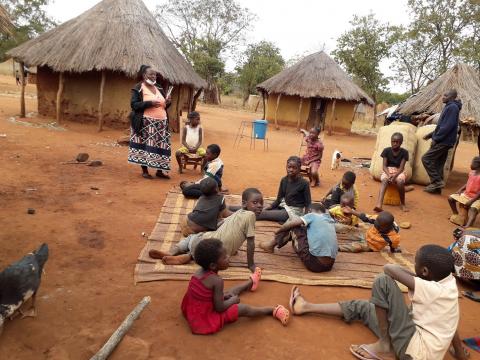Community volunteer takes pride in helping her community

Little or no access to vital and factual information coupled with misconceptions about the coronavirus pandemic increases people's vulnerability and exposure to the virus. To raise awareness about COVID-19 in rural communities, World Vision works with Community volunteers to reach a good number of people as they have direct relationships with most people in their villages.
Community volunteers selflessly render their services to help people by sensitising them on social issues that affect their communities. Before they begin delivering messages, World Vision empowers Community volunteers with knowledge on conducting COVID-19 sensitisation in all areas where the organisation operates. Training equips volunteers with knowledge as they conduct sessions.
With the number of COVID-19 cases on the rise in Zambia, community volunteers have heightened the awareness of COVID-19 messages in rural areas by holding door-to-door sessions with families. Christine Zulu, 47, of Ndake village in Nyimba, is one of 58 community volunteers trained by World Vision in Nyimba district. Since the outbreak of the disease, Christine has been regularly holding door-to-door sessions, sensitising families on the pandemic.

The door-to-door approach ensures that everyone has access to the right information about the disease. This approach has proved to be an effective way of conducting the sensitisations as it reduces social gatherings and reduces the risks of exposure to contracting the disease. With this approach, Community Volunteers in Nyimba District have been able to cover all 187 villages in the four zones where the World Vision Area Programme is operational and have subsequently managed to sensitise 8,118 people.
Since the outbreak of the pandemic, Christine has devoted most of her time on sensitising her community, and has so far been able to sensitise over 300 people in Ndake village and surrounding areas: "Ever since I attended the World Vision COVID-19 sensitisation training, I started visiting people's homes to sensitise them about the virus. I do not mobilize community members like I previously used to as big crowds increases the risks of contracting the disease," says Christine. "During these sessions, I encourage families to ask questions while I take the opportunity to dispel any misconceptions and myths about the disease."

As she conducts her awareness sessions, Christine shares vital information through visual poster distribution and demonstrations depicting hygiene measures and restrictions on gatherings, travel, and guides on maintaining social distancing.
"When I conduct these sessions, I demonstrate how community members can protect their families by frequently washing their hands with soap and maintaining a safe distance from anyone who is coughing or sneezing. I also tell them to avoid touching their eyes, nose or mouth; covering their noses and mouths with a bent elbow when they cough and sneeze, and staying at home when they are not feeling well," she says.
To determine their understanding of the disease, Christine allows them to ask questions freely: "I always encourage families to share their knowledge, and I ask questions on what they know about the disease, and through this assessment, I can dispel myths and misconceptions about the pandemic," she adds.
The unavailability and high costs of essential preventative materials such as non-reusable face masks and hand sanitisers disadvantage most people in rural areas, as most families cannot afford to buy them daily.
"Because most families cannot afford to buy reusable face masks and hand sanitisers, I encourage them to make reusable face masks using their old chitenge [African print] materials or handkerchiefs. I also demonstrate how to wash their hands using their bath or dishwashing soaps properly," she adds.
This guidance provides critical messages for engaging members of the community in promoting safe and healthy environments, and after the sessions, Christine does regular follow-up visits to inspect if people are adhering to the preventative measures she taught them.
"I am proud that my work keeps people informed about COVID-19, while I simultaneously highlight the efforts that World Vision is doing in mitigating the spread of the disease. We have to look out for one another because all we have is each other," Christine concludes.
Community volunteers like Christine play an essential role in enabling members of their communities to access information and facts about COVID-19. Sensitisations will also help diminish their fears and anxieties around the disease and help them cope with any secondary impacts in their lives.
Learn more about World Vision’s global work to limit the spread of COVID-19 and support the children impacted by it on our COVID-19 Emergency Response Page.